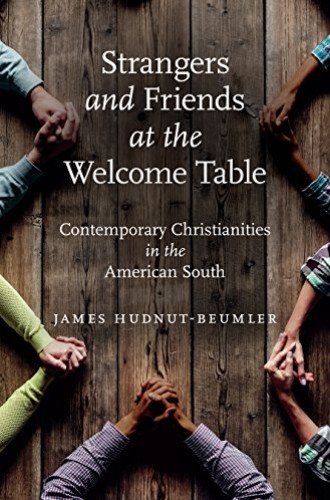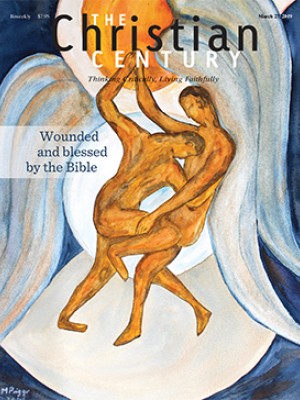A northerner explores Christianity in the American South
James Hudnut-Beumler profiles churches, ministries, and movements with long-held traditions and potential for change.
James Hudnut-Beumler remembers taking road trips to visit his father’s family in southern Ohio. On the ride home to Michigan, he and his brother would imitate the unfamiliar “twanging accents” of their relatives. Today Hudnut-Beumler teaches American religious history at Vanderbilt University and considers himself “a student of southern religion and culture.”
Based on a decade of interviews and observations, the book gives an overview of contemporary southern Christianity. Hudnut-Beumler profiles several dozen ministries, movements, and churches. He begins by revisiting a tradition familiar to the South: celebrated southern hospitality. He extols southerners’ generosity in welcoming, feeding, and caring for people in their churches and “extended community.” Then he explains the limits of this hospitality: many southerners are opposed to government programs, including those that would extend aid to poor people whom the churches aren’t reaching. Many observers, including the author, see a contradiction here (since people in the South experience the greatest levels of food insecurity in the United States).
Read our latest issue or browse back issues.
Yet Hudnut-Beumler highlights exceptions. Christian outreach ministries that address poverty include the United Methodist Society of St. Andrew, the evangelical organization Feed America First, and the impressive 31-year-old ministry of Room in the Inn, an interfaith effort that began with providing shelter to homeless people and now offers the Campus for Human Development with thousands of courses “from spirituality to GED preparation.” He also lifts up examples of outsized, unexpected Christian social action in response to Hurricane Katrina, including the Common Good, RHINO (Rebuilding Hope in New Orleans), and the Micah Project.
Another traditional southern theme is the “religion of the Lost Cause,” or what its advocates call the “sacred battle for collective memory” of the Civil War. Hudnut-Beumler believes that the current rhetoric about the Civil War is stronger than it was at any time in the 20th century (and the book concludes before events like the 2017 Charlottesville demonstrations). He attends events held by the 30,000-member Sons of Confederate Veterans, a group that honors those who fought for their homeland, including African American Confederate soldiers. The SCV displays the Confederate battle flag, though its members formally reject the use of the flag “to espouse racial superiority.”
In a chapter on religion and politics, the author highlights Alabama judge Roy Moore as an example of evangelical obedience to Christian conscience. Moore’s supporters rallied behind him, Hudnut-Beumler explains, because “God, America, and the family are a package, and any threat to the package is an intolerable assault on law and faith equally.” The author contrasts Alabama’s 2001 anti-immigration act with civil rights activist William Barber II and North Carolina’s Moral Mondays protests.
Hudnut-Beumler claims that although the South’s Pentecostal churches account for only 6 percent of the religious population, the Pentecostal tradition (with its 57 denominations) continues to influence all of southern Christianity. He gives a short history of restoration and sanctification movements, visits Lee University in Cleveland, Tennessee, and—on the Sunday after Donald Trump’s election victory—worships at Nashville’s predominantly African American Cathedral of Praise Church of God in Christ. There, Bishop Jerry Maynard preaches on Exodus 14:13–15, extolling his congregation to “go forward” in response to its discouragement with the election results.
Hudnut-Beumler also reports on megachurches, which are prevalent in the South. He visits Bellevue, a 30,000-member Southern Baptist church in Memphis, the “campus church” at Liberty University in Virginia, the prosperity gospel-fueled New Birth Missionary Baptist Church in Lithonia, Georgia, and Memphis’s celebrated St. Andrew AME.
Readers may be amazed, as I was, by a chapter on homeschooling movements in the South. For $65, the author attends a Teach Them Diligently homeschooling convention in Nashville, organized by David and Leslie Nunnery of Greenville, South Carolina. The Nunnerys’ vision focuses on creationism, leadership in the home, and the marketing of merchandise. They are suspicious of scientific realities and public schools. For homeschoolers, says Hudnut-Beumler, public schools are “an affront to God, the Bible, political freedom, and Christian liberty.” The extent of the homeschooling operation extends to legal services for Christian homeschoolers, special skincare (not makeup) products for moms and daughters, and materials advocating vasectomy reversal. One curriculum bases its teachings on “Cat n Dog theology.” The popularity of these movements is as strong as ever, with 45 conventions held each year and 3 million children homeschooled.
In his brief history of LGBT attitudes among southern Christians, Hudnut-Beumler highlights two inclusive congregations: Metropolitan Interdenominational Church in Nashville and Covenant of the Cross, also near Nashville. He claims that southern Christianity is “at a crossroads . . . about what loving one’s neighbors requires.”
I’m not convinced that the South has arrived at this crossroads. In 2010, the U.S. religion census showed the number of LGBT-affirming congregations in most southern states to be under 1 percent. Statistics and political choices since then suggest that few southerners are involved in a radical shift toward acceptance of LGBT persons.
Hudnut-Beumler is right that the contemporary South is still “religiously distinct and dominantly Christian.” I’m less convinced by his claim that southern Christianity is steadily and “inexorably changing and becoming more diverse in the forms of expression.” Instead, the tilt of national politics seems to have engraved traditional southern sentiments—antigovernment, antigay, pro-Confederacy racist—ever more deeply into the national consciousness. The lines between local and extended hospitality, between adherence to creationism and acceptance of evolution, between regional and national identity, seem more pronounced than ever.
But one comment stays with me as a sign of the vitality and vigor that are shared by many in the South. Pete Gathje, founder of Manna House and a professor at Memphis Theological Seminary, says he was happy to have relocated to the South because it’s “a place where people still take the Bible seriously” as “a book with authority” that can be used to “organize conversations with meaningful disputes.” Where conversation is welcomed, the South may indeed be changing, stretching its hospitality in vigorous and imaginative ministries.








